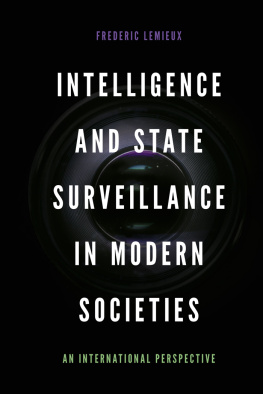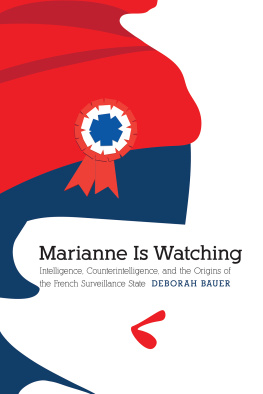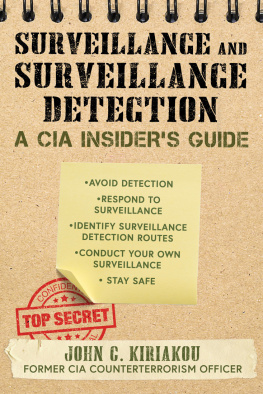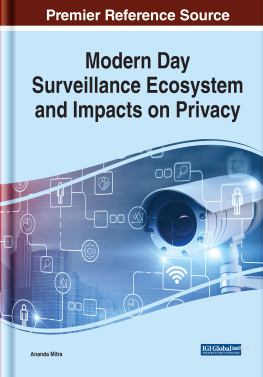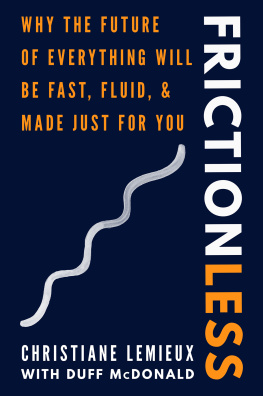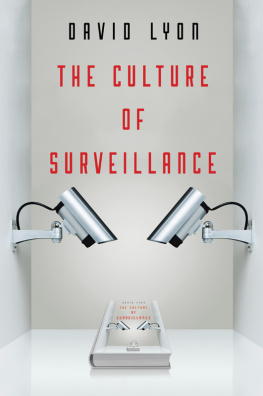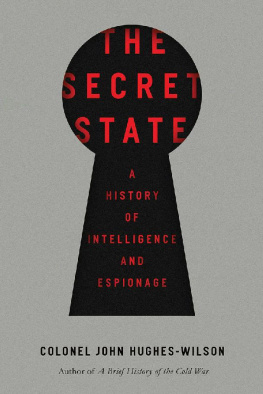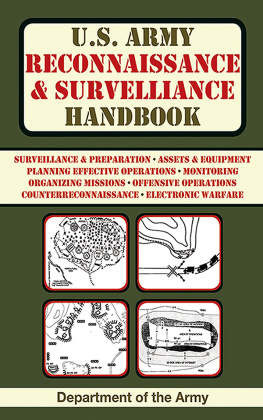Lemieux Frédéric - Intelligence and State Surveillance in Modern Societies
Here you can read online Lemieux Frédéric - Intelligence and State Surveillance in Modern Societies full text of the book (entire story) in english for free. Download pdf and epub, get meaning, cover and reviews about this ebook. year: 2018, publisher: Emerald Publishing Limited, genre: Politics. Description of the work, (preface) as well as reviews are available. Best literature library LitArk.com created for fans of good reading and offers a wide selection of genres:
Romance novel
Science fiction
Adventure
Detective
Science
History
Home and family
Prose
Art
Politics
Computer
Non-fiction
Religion
Business
Children
Humor
Choose a favorite category and find really read worthwhile books. Enjoy immersion in the world of imagination, feel the emotions of the characters or learn something new for yourself, make an fascinating discovery.
- Book:Intelligence and State Surveillance in Modern Societies
- Author:
- Publisher:Emerald Publishing Limited
- Genre:
- Year:2018
- Rating:3 / 5
- Favourites:Add to favourites
- Your mark:
- 60
- 1
- 2
- 3
- 4
- 5
Intelligence and State Surveillance in Modern Societies: summary, description and annotation
We offer to read an annotation, description, summary or preface (depends on what the author of the book "Intelligence and State Surveillance in Modern Societies" wrote himself). If you haven't found the necessary information about the book — write in the comments, we will try to find it.
Intelligence and State Surveillance in Modern Societies — read online for free the complete book (whole text) full work
Below is the text of the book, divided by pages. System saving the place of the last page read, allows you to conveniently read the book "Intelligence and State Surveillance in Modern Societies" online for free, without having to search again every time where you left off. Put a bookmark, and you can go to the page where you finished reading at any time.
Font size:
Interval:
Bookmark:

ACIC. (2017). Australian criminal intelligence management strategy 201720. Canberra: Australian Criminal Intelligence Commission.
Agranoff, R., & McGuire, M. (2001). Big questions in public network management research. Journal of Public Administration Research and Theory, 11(3), 295396.
Akrivopoulou, C. M., & Garipidis, N. (2013). Digital democracy and the impact of technology on governance and politics: New globalized practices. Hershey, PA: IGI Global.
Albanese, J. S. (2008). Risk assessment in organized crime. Developing a market and product-based model to determine threat levels. Journal of Contemporary Criminal Justice, 24(3), 263273.
Altham, J. E. J. (1983). Ethics of risk. Proceedings of the Aristotelian Society, 84, 1529.
Anderson, M. (2002). Trust and police co-operation. In M. Anderson & J. Apap (Eds.), Police and justice co-operation and the new European borders (pp. 3546). The Hague: Kluwer Law International.
Andreas, P., & Nadelmann, E. (2006). Policing the globe. Oxford: Oxford University Press.
Antebi, L. (2014). Changing trends in unmanned aerial vehicles: New challenges for states, armies and security industries. Military and Strategic Affairs, 6(2), 2136.
Arenas, M., Barcelo, P., Libkin, L., & Murlak, F. (2014). Foundations of data exchange. Cambridge: Cambridge University Press.
Arrow, K. J. (1971). A utilitarian approach to the concept of equality in public expenditures. Quarterly Journal of Economics, 85(3), 409419.
Audit Commission. (1993). Helping with enquiries. Tackling crime effectively. London: Her Majesty's Stationery Office.
Bar-Joseph, U. (2013). The politicization of intelligence: A comparative study. International Journal of Intelligence and CounterIntelligence, 26(2), 347369.
Bayley, D. H. (1994). Police for the future. New York, NY: Oxford University Press.
Bayley, D., & Shearing, C. (2001). The new structure of policing: Description, conceptualisation, and research agenda. Washington, DC: National Institute of Justice.
Beck, U. (1992). Risk society: Toward a new modernity. Thousand Oaks, CA: Sage Publications.
Bellaby, R. (2014). The ethics of intelligence: A new framework. New York, NY: Routledge.
Bentham, J. (2009). Panopticon or the inspection house. Newcastle upon Tyne: Cambridge Scholars Publishing.
Benyon, J., Turnbull, L., Willis, A., Woodward, R., & Beck, A. (1993). Police cooperation in Europe: An investigation. Leicester: Centre for the Study of Public Order, University of Leicester.
Bernard, L. L. (1939). Social control in its sociological aspects. New York, NY: Macmillan Publishing.
Best, R. A., & Elsea, J. K. (2011). Satellite surveillance: Domestic issues. Washington, DC: Congressional Research Service.
Betts, R. K. (2002). Fixing intelligence. Foreign Affairs, 80(1), 4359.
Bichard, M. (2004). The Bichard inquiry report. London: Home Office.
Bigo, D. (1996). Polices en Rseaux: Lexprience Europenne. Paris: Presse de Sciences Po.
Bigo, D. (2002). Border regimes and security in an enlarged European community. In J. Zielonka (Ed.), Europe unbound: Enlarging and reshaping the boundaries of the European Union (pp. 213239). New York, NY: Routledge.
Birkinshaw, J., & Sheehan, T. (2002). Managing the knowledge lifecycle. MIT Sloan Management Review, 44(1), 7583.
Bitner, E. (1970). The functions of the police in modern society. Washington, DC: National Institute of Mental Health, Center for Studies of Crime and Delinquency.
Blackler, F. (1995). Knowledge, knowledge work and organizations: An overview and interpretation. Thousand Oaks, CA: Sage Publications.
Boba, R. (2013). Crime analysis with crime mapping. Thousand Oaks, CA: Sage Publications.
Boersma, K., Brakel, R. V., Fonio, C., & Wagenaar, P. (2014). History of state surveillance in Europe and beyond. New York, NY: Routledge.
van den Boorn, G. F. P. (2014). The duties of the vizier. New York, NY: Routledge.
Botha, A., Kourie, D., & Snyman, R. (2008). Coping with continuous change in the business environment, knowledge management and knowledge management technology. New York, NY: Elsevier.
Brandon, B. C., & Farrington, D. P. (2009). Making public place safer: Surveillance and crime prevention. Oxford: Oxford University Press.
Brantingham, P. J., & Brantingham, P. L. (1981). Environmental criminology. Thousand Oaks, CA: Sage Publications.
Bressler, F. (1992). Interpol. Paris: Presses de la Cit.
Brodeur, J-P. (2010). The policing web. Oxford: Oxford University Press.
Brodeur, J. P., & Dupont, B. (2006). Knowledge workers or knowledge workers? Policing and Society, 16(1), 726.
Brodeur, J-P., Gill, P., & Tolborg, D. (2003). Democracy, law, and security: Internal security services in contemporary Europe. Burlington, VT: Ashgate.
Bruggeman, W. (2002). Policing and accountability in a dynamic European context. Policing and Society, 12(4), 259273.
Bullington, B., & Block, A. (1990). A Trojan horse: Anti-communism and the war on drugs. Contemporary Crises, 14(1), 3955.
Carter, D. L., & Carter, J. G. (2009). Intelligence-led policing: Conceptual considerations for public policy. Criminal Justice Policy Review, 20(3), 310325.
Castells, M. (2010). The rise of the network society. The information age: Economy, society, and culture (Vol. 1). Hoboken, NJ: John Wiley & Sons.
Castillo, J. (2003). Challenging the knowledge management mystique. Journal of Management Research, 3(3), 152172.
Center for Disease Control and Prevention. (2013). Surveillance for foodborne disease outbreaks in United States. Atlanta, GA: Center for Disease Control and Prevention.
Chainey, S., & Ratcliffe, J. (2013). GIS and crime mapping. Hoboken, NJ: John Wiley & Sons.
Chesterman, S., & Fisher, A. (2009). Private security, public order: The outsourcing of public services and its limits. In S. Chesterman & A. Fisher (Eds.), Private security, public order: The outsourcing of public services and its limits (pp. 17). Oxford: Oxford University Press.
Childress, J. F. (1978). Ethical issues in death and dying. Religious Studies Review, 4(3), 180188.
Choo, C. W. (2002). Information management for the intelligent organization: The art of scanning the environment. Medford, NJ: Information Today Inc.
Christensen, C. M. (1997) The innovator's dilemma: When new technologies cause great firms to fail. Boston, MA: Harvard Business School Press.
Cockburn, A., & St. Clair, J. (2014). Whiteout: The CIA, drugs and the press. New York, NY: Verso Books.
Cohen, E. (2010). Mass surveillance and state control: The total information awareness project. Berlin: Springer.
Cohen, L., & Felson, M. (1979). Social change and crime rate trends: A routine activity approach. American Sociological Review, 44(4), 588608.
Copland, C. (2010). Terrorism and security issues facing the water infrastructure sector. Washington, DC: Congressional Research Service.
Corti, D., & Swain, A. (2009). War on drugs and war on terror: Case of Afghanistan. Peace and Conflict Review, 3(2), 4153.
Cox, J. S. (2012). Canada and the five eyes intelligence community
Font size:
Interval:
Bookmark:
Similar books «Intelligence and State Surveillance in Modern Societies»
Look at similar books to Intelligence and State Surveillance in Modern Societies. We have selected literature similar in name and meaning in the hope of providing readers with more options to find new, interesting, not yet read works.
Discussion, reviews of the book Intelligence and State Surveillance in Modern Societies and just readers' own opinions. Leave your comments, write what you think about the work, its meaning or the main characters. Specify what exactly you liked and what you didn't like, and why you think so.

